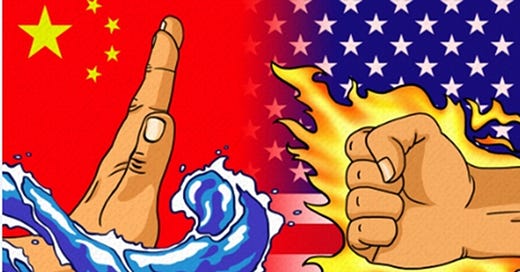PREAMBLE
Once, USSoS Blinken told Haass of Council on Foreign Relations, that what’s coming is a ‘long-term competition’ with China, over the challenges it poses, with no finish line.
And, the speech at the George Washington University on May 26, 2022 that US only wanted to “contain and suppress China’s development and uphold US hegemony.” (TheHindu, 28/05/2022).
However, in the seven hours which Blinken spent with Chinese Foreign Minister Qin Gang and Wang Yi, Director of Foreign Affairs in the Chinese Communist Party Central Committee, culminated in a meeting between Blinken and President Xi Jinping, he was reported by Voice of America on 19th. June, 2023, telling his Chinese hosts that America does not support Taiwan independence. Rather, he reiterated ‘the long-standing US one China policy’.
Behind the ‘one-China policy’, it seems, are two China policies. One of them preserves the status quo. The other is designed to perpetuate US dominance, through war over Taiwan if necessary, blaming it on China, as queried by Dr Alison Broinowski, President of Australians for War Powers Reform.
Inbuilt onto US Asia-Pacific strategy is not only AUKUS as Asia's NATO or I2US (see firestorms, 2022, The Western Indian Ocean QUAD), but the whole hegemonic US blinkened strategy in the Indo-Asia-Pacific basins - where they become trans-oceanic basins of conflicts, (prudent to read also firestorms, 2022, Destined for War).
Continuing, nevertheless, with the shared responsibility and common interests between the two states, here's Liu Jianchao, head of the International Department of the CPC Central Committee, observation.
Delivering a speech at the 11th World Peace Forum - an event organized by Tsinghua University - in Beijing on 2nd July, 2023, Liu Jianchao, head of the International Department of the CPC Central Committee, has this to say:
China and the U.S. have a shared responsibility and common interests that have remained unchanged over time, and a focus on these shared areas will help develop better bilateral relations.
“China and the United States, together with others, share the common responsibility to bring about a better world for the peoples in this world. So that has not changed,” said Liu, responding to a question over what has changed in U.S.-China relations compared to the 1970s when the two countries normalized diplomatic relations.
Liu is a diplomatic veteran who served as Chinese ambassador to the Philippines and then to Indonesia. The Oxford-educated official was also the spokesperson of the Ministry of Foreign Affairs in the 2000s.
While addressing this year’s WPE, Liu noted that Beijing and Washington can work and develop “on the right track” if neither side tries to seek unilateral advantage or widen the lead by one country while pushing the other down.
The U.S. side should have a “very clear-minded picture and strategy” about what is good for both countries and the world, Liu said, adding that “wrong decisions and bad moves” would be counterproductive to the global community.
When asked about the current communication status between the CPC and the political parties in the U.S., Liu said the party has maintained exchanges with the GOP, the Democrats, Congress and the private sector.
A political party dialogue between the two countries was also held recently, Liu added, noting it was the “right approach” in getting bilateral relations back on track.
Liu also reiterated China’s commitment to peace and called on all parties to stand against unilateralism and “reject attempts to build walls and barriers and fences or seek decoupling and disruption of chains.”
The former ambassador said an economic foundation and security guarantees are prerequisites to achieve long-lasting peace, stressing that the special needs of developing countries should be accommodated “so that all countries share the fruits of development in a fairer way.”
China released its Law on Foreign Relations last week which sets out the country’s goals and policies in foreign affairs. Liu, who participated in the early stages of the formulation of the law, said the move was aimed at putting the guiding principles and “cornerstones of China’s foreign policy” into law.
“I think that our colleagues and our partners in other parts of the world can have better confidence and better predictability for China’s policy. So China’s foreign policy will be based on this law,” Liu said.



